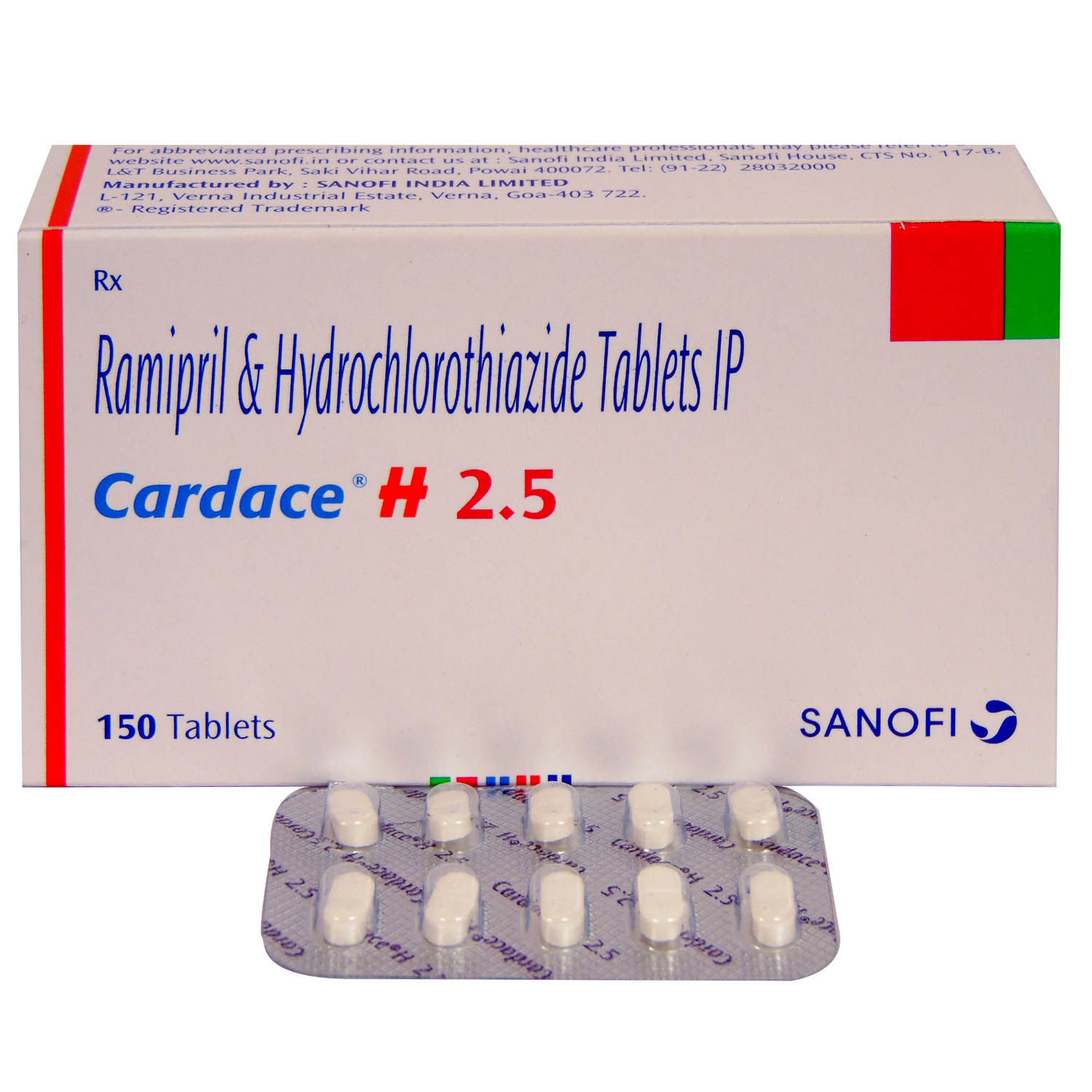Ramisa H 2.5mg/12.5mg Tablet
₹45.45*
MRP ₹50.5
10% off
₹42.92*
MRP ₹50.5
15% CB
₹7.58 cashback(15%)
Free Delivery
With Circle membership
(Inclusive of all Taxes)
This offer price is valid on orders above ₹800. Apply coupon PHARMA10/PHARMA18 (excluding restricted items)
Know Your Delivery Time
Provide Delivery Location

Whats That

Secure Payment

India's Most Trusted Pharmacy

Genuine Products
Composition :
Manufacturer/Marketer :
Consume Type :
Return Policy :
About Ramisa H 2.5mg/12.5mg Tablet
Ramisa H 2.5mg/12.5mg Tablet is prescribed alone or in combination with other drugs to lower the raised blood pressure. Hypertension (High blood pressure) is a condition in which the force exerted by the blood against the artery walls becomes so high that it causes health problems, such as heart disease.
Ramisa H 2.5mg/12.5mg Tablet contains two medicines: Ramipril (blood pressure-lowering agent) and Hydrochlorothiazide (diuretics or water pills). Ramipril is an angiotensin-converting enzyme or ACE inhibitor that lowers increased blood pressure by blocking a naturally occurring substance known as angiotensin II (that tightens your blood vessels). It allows these constricted blood vessels to relax and, therefore, helps lower high blood pressure. On the other hand, Hydrochlorothiazide (diuretic) works by increasing the amount of urine passed out from the kidneys. It effectively reduces excess fluid overload in the body and treats oedema (swelling) associated with heart, liver, kidney, or lung disease. This reduces the heart's workload and makes the heart more efficient at pumping blood throughout the body. Thus, both help lower high blood pressure and reduce the chances of heart attacks or strokes.
You can take Ramisa H 2.5mg/12.5mg Tablet with a meal or after/before a meal. Your doctor will advise you on the exact dosage and how often you have to take Ramisa H 2.5mg/12.5mg Tablet based on your medical condition. Sometimes, you may experience headaches, tiredness, slow heart rate, and nausea. Most of these side effects of Ramisa H 2.5mg/12.5mg Tablet do not require medical attention and gradually resolve over time. However, if the side effects are persistent, reach out to your doctor. Ramisa H 2.5mg/12.5mg Tablet may lower your blood pressure, especially if taken with alcohol. So, avoid driving and operating heavy machinery.
Try not to stop taking this medicine of your own. You should not stop using the Ramisa H 2.5mg/12.5mg Tablet even if your blood pressure becomes normal. Doing so may worsen your condition. Tell your doctor if you have had or currently have liver, kidney, or heart problems. Ramisa H 2.5mg/12.5mg Tablet is not recommended in pregnancy and lactation. You should regularly monitor your blood pressure and heart rate. Please tell your doctor if you are taking any other medicines or are allergic to Ramisa H 2.5mg/12.5mg Tablet. Reducing the amount of table salt (sodium chloride) in your food often relieves the body's swelling.
Uses of Ramisa H 2.5mg/12.5mg Tablet
Medicinal Benefits
Ramisa H 2.5mg/12.5mg Tablet contains Ramipril and hydrochlorothiazide. Ramipril is an angiotensin-converting enzyme (ACE) inhibitor that lowers increased blood pressure by blocking a naturally occurring substance known as angiotensin II (that tightens your blood vessels). It allows these constricted blood vessels to relax and, therefore, helps lower high blood pressure. On the other hand, Hydrochlorothiazide (diuretic) works by increasing the amount of urine passed out from the kidneys. It effectively reduces excess fluid levels in the body and treats oedema (swelling) associated with heart, liver, kidney, or lung disease. This reduces the heart's workload and makes the heart more efficient at pumping blood throughout the body. Thus, both help lower high blood pressure, reducing the chances of heart attack or stroke. However, Ramisa H 2.5mg/12.5mg Tablet does not cure high blood pressure (hypertension) but does help control it. In addition to this, Ramisa H 2.5mg/12.5mg Tablet also reduces the physical effects of anxiety.
Side Effects of Ramisa H 2.5mg/12.5mg Tablet
- Feeling dizzy or lightheaded
- Headache
- Diarrhoea
- Being sick
- Mild skin rash
- Blurred vision
- Hypotension
- Nausea (feeling sick)
Directions for Use
Storage
Drug Warnings
Ramisa H 2.5mg/12.5mg Tablet should not be given to the people allergic to Ramisa H 2.5mg/12.5mg Tablet, have low blood pressure (less than 90 mm of Hg), have had a heart attack, diabetes, kidney disease, liver disease, are pregnant women, or planning to get pregnant and breastfeeding women. Ramisa H 2.5mg/12.5mg Tablet may alter your blood sugar level, so tell your doctor about this before using Ramisa H 2.5mg/12.5mg Tablet. Besides this, it is contraindicated in low blood pressure (hypotension), cardiogenic shock (sudden stopping of blood flow to the heart), anuria (patients with nil urine output), and aortic stenosis (heart valve problem). Ramisa H 2.5mg/12.5mg Tablet can pass into breast milk, but its effect on the baby is unknown. So, it is better to tell your doctor if you take Ramisa H 2.5mg/12.5mg Tablet and breastfeeding. Do not consume alcohol with Ramisa H 2.5mg/12.5mg Tablet as it may increase the risk of low blood pressure. Avoid potassium supplements with Ramisa H 2.5mg/12.5mg Tablet as they may lead to high potassium levels in the blood. Regular blood tests and blood pressure monitoring are recommended while taking Ramisa H 2.5mg/12.5mg Tablet. Drink a lot of fluids as Ramisa H 2.5mg/12.5mg Tablet can cause dehydration, so to avoid unpleasant side effects, increase the intake of fluids.
Therapeutic Class
Drug-Drug Interactions
Drug-Food Interactions
Diet & Lifestyle Advise
Keep your weight under control with a body mass index (BMI) of 19.5-24.9.
Do regular physical activity or exercise for at least 150 minutes per week, or about 30 minutes most days of the week. Doing this can help lower your raised blood pressure by about 5 mm Hg.
Opt for a diet rich in whole grains, fruits, veggies, and low-fat dairy products.
Limit sodium chloride (table salt) intake in your daily diet to 2300 mg per day or less than 1500 mg is ideal for most adults.
If you are taking alcohol, then only one serving for women and two servings is advisable.
Quitting smoking is the best strategy to lower the risk of heart disease.
Avoid chronic stress as it can raise your blood pressure. Try to enjoy and spend time with your loved ones to cope with stress and practice mindfulness techniques.
Monitor your blood pressure daily and if there is too much fluctuation, immediately contact your doctor.
Including heart-healthy omega-3 fatty acid acid-containing foods in your daily diet.
Use low-fat cooking oil like olive oil, soybean oil, canola oil, and coconut oil to lower your elevated blood pressure.
Habit Forming
How Ramisa H 2.5mg/12.5mg Tablet Works
What if I have taken an overdose of Ramisa H 2.5mg/12.5mg Tablet
Alcohol
Unsafe
Ramisa H 2.5mg/12.5mg Tablet may enhance the hypotensive (low blood pressure) effect if alcohol is taken along with. For better advice, you should consult your doctor about whether you can take Ramisa H 2.5mg/12.5mg Tablet with alcohol.
Pregnancy
Unsafe
The use of Ramisa H 2.5mg/12.5mg Tablet or any ACE inhibitors (Ramipril) is usually contraindicated during the second and third trimester of pregnancy. It may cause harm to the developing fetus. Hence, you should always consult your doctor before using Ramisa H 2.5mg/12.5mg Tablet.
Breast Feeding
Caution
Use of Ramisa H 2.5mg/12.5mg Tablet is not recommended during the breastfeeding stage.
Driving
Unsafe
Drive with caution, Ramisa H 2.5mg/12.5mg Tablet may cause blurry vision, and dizziness or weariness may occur.
Liver
Caution
Rare elevation in the liver enzymes (like bilirubin) has been observed while taking Ramisa H 2.5mg/12.5mg Tablet, so it must be taken with caution. If you have a history of liver diseases/conditions, the dose may have to be adjusted by your doctor.
Kidney
Caution
Ramisa H 2.5mg/12.5mg Tablet to be taken with caution, especially in case of severe kidney disease. The dose may have to be adjusted by your doctor. Ramisa H 2.5mg/12.5mg Tablet should be given with precaution in hemodialysis condition.
Children
Caution
Ramisa H 2.5mg/12.5mg Tablet is not recommended for children. The safety and effectiveness of Ramisa H 2.5mg/12.5mg Tablet have not been established in children due to limited testing of this drug on children by competent authorities worldwide. If necessary, your doctor will decide whether to give Ramisa H 2.5mg/12.5mg Tablet or not.
Country of origin
Author Details
We provide you with authentic, trustworthy and relevant information
FAQs
Disclaimer
Product Substitutes















